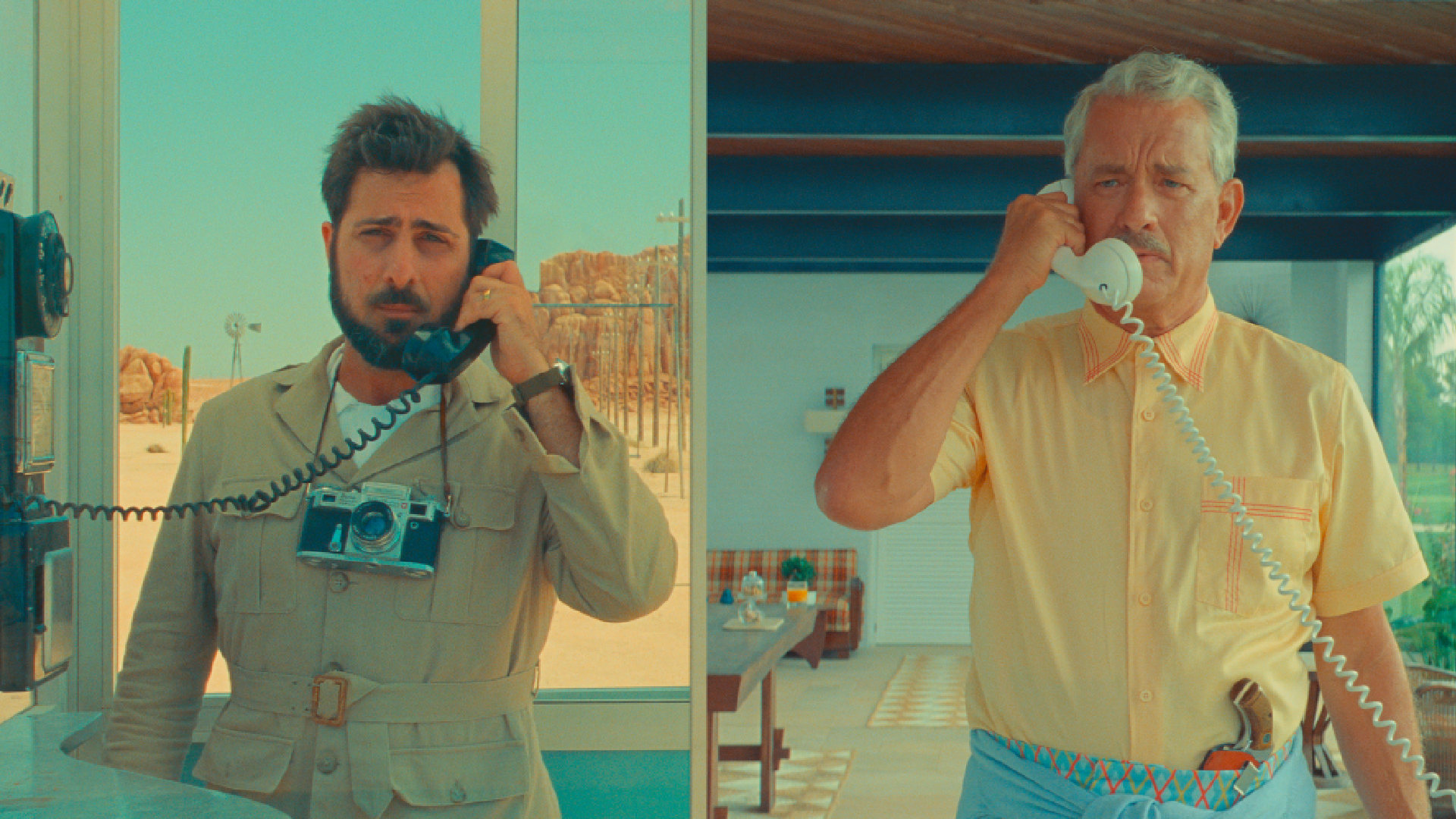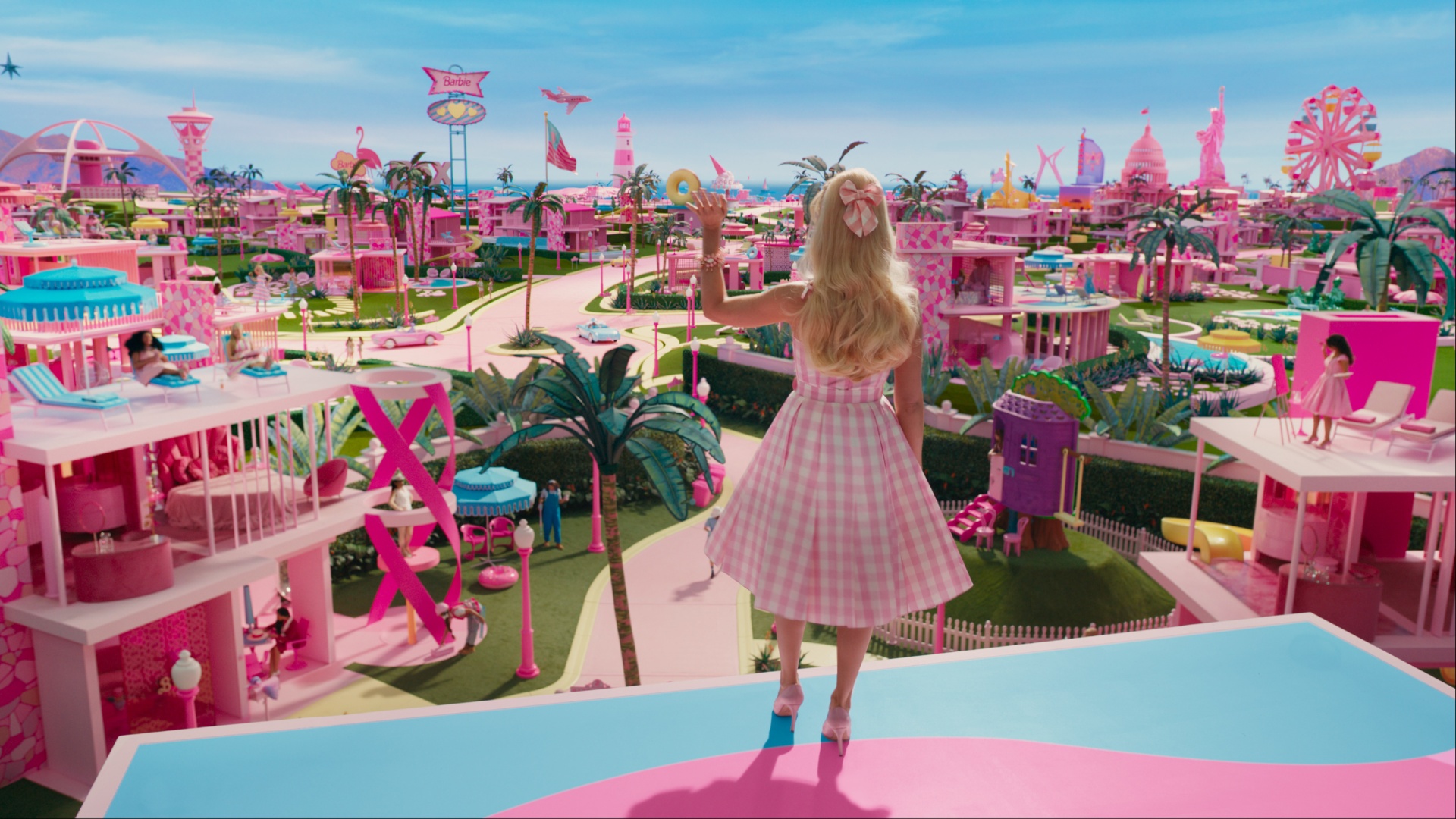
It's the summer of Barbenheimer, AKA cinema's hottest double bill. It consists of Oppenheimer, Christopher Nolan's biopic of the father of the atomic bomb, and Barbie, a bold, pink-hued blockbuster from Greta Gerwig, as back-to-back viewings. Many have argued that this duo makes an unlikely but appropriate pairing; polar opposites with surprising shared themes.
But there's another movie that hit cinemas this summer, that makes an even better pairing with Barbie: Wes Anderson's Asteroid City. Let's start off on a surface level – both movies have distinctive visual styles with bright colors and vibrant, intricate production designs, which are used to denote settlements that are isolated from the world around them.
In Anderson's film, it's Asteroid City, a remote desert town with a population of 87, inundated with a group of "junior stargazers and space cadets" for an astronomy convention. In Barbie, it's Barbie Land, a utopian cluster of Dream Houses where every Barbie is having the best day ever. That is, until Stereotypical Barbie (Margot Robbie) starts having irrepressible thoughts of death.
Neither of these places feels real, and Asteroid City and Barbie both reckon with their own artifice. In Asteroid City, it's through its narrative framing device – the story of Augie, Woodrow, and co. that we're watching is actually a play, written by Conrad Earp (Edward Norton), and the 'real world' is black and white, juxtaposed with the technicolor of the desert. "Asteroid City does not exist," Bryan Cranston's television host says as the film begins, establishing a blurred line between fiction and reality from the off. In Barbie, there's the divide between Barbie Land and the real world, made literal through Barbie (and Ken)'s voyage between the two – via car, boat, plane, tandem bike, camper van, snowmobile, and rollerskates.
While Barbie is having thoughts of death, grief is at the center of Asteroid City. When one of the junior stargazers, Woodrow Steenbeck, AKA Brainiac (Jake Ryan), arrives in town with his three younger sisters and their father, Augie (Jason Schwartzman), we quickly find out that the newly widowed war photographer still hasn't told his kids that their mother died, three weeks after the event.

Barbie, too, reckons with her own mortality. Towards the end of the movie, she questions her future as a doll, expressing a desire to be something more than just "an idea" and pondering the potential of life as a human. "Humans only have one ending," Barbie inventor Ruth Handler (Rhea Perlman) warns her. She accepts her fate, regardless.
An imagined future also hangs over Asteroid City. Towards the end of the movie, the actor playing Augie in the play storms off stage mid-performance, decrying the fact that he doesn't "understand" it to the play's director. Heading outside for a smoke break, he encounters an actor performing at the theatre next door, who's also going for a cigarette – played, coincidentally, by Robbie. Robbie's character was meant to portray Augie's late wife in the play, but the role was cut, and the pair recite the lines from their scene together in a disarmingly tender moment.
In both films, there's a sadness at the heart of their protagonists. "Everything's connected, but nothing's working," Tilda Swinton's scientist says in Asteroid City, referring to her equipment, but this innocuous line of dialogue summarizes both movies. Artifice is a form of denial and a way of coping with grief, which both characters have to leave behind to move on, whether that's Barbie starting a new life in the real world or Augie driving away from Asteroid City.
It's their connections with others that holds them together, though – Barbie with human Gloria (America Ferrera) and her tween daughter Sasha (Ariana Greenblatt), and Augie with reserved A-list actor and fellow junior stargazer parent Midge (Scarlett Johansson). While Barbie and Gloria's relationship survives the movie, Augie and Midge's doesn't – she leaves Asteroid City without saying goodbye, leaving him the details of a PO box as her only forwarding address.
What Augie has left, then, in the end, is his son Woodrow. Much like Gloria and Sasha, a strained parent-child relationship is healed, slowly and carefully, through an abnormal shared experience: restoring order to a society of living dolls and a close encounter of the third kind, respectively. While these two movies don't have much in common at first glance, peel back the curtain and there's a melancholy tenderness integral to both. Oh, and a surprisingly catchy musical number.
Barbie is in cinemas now. For more on the movie, check out the rest of our coverage:







